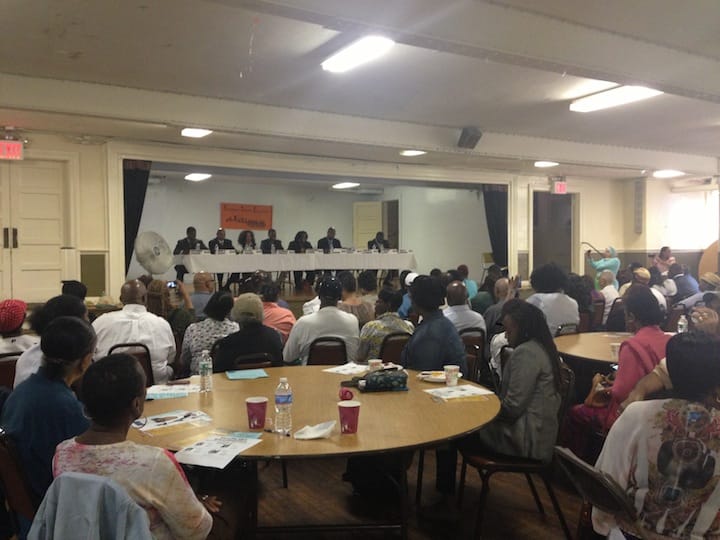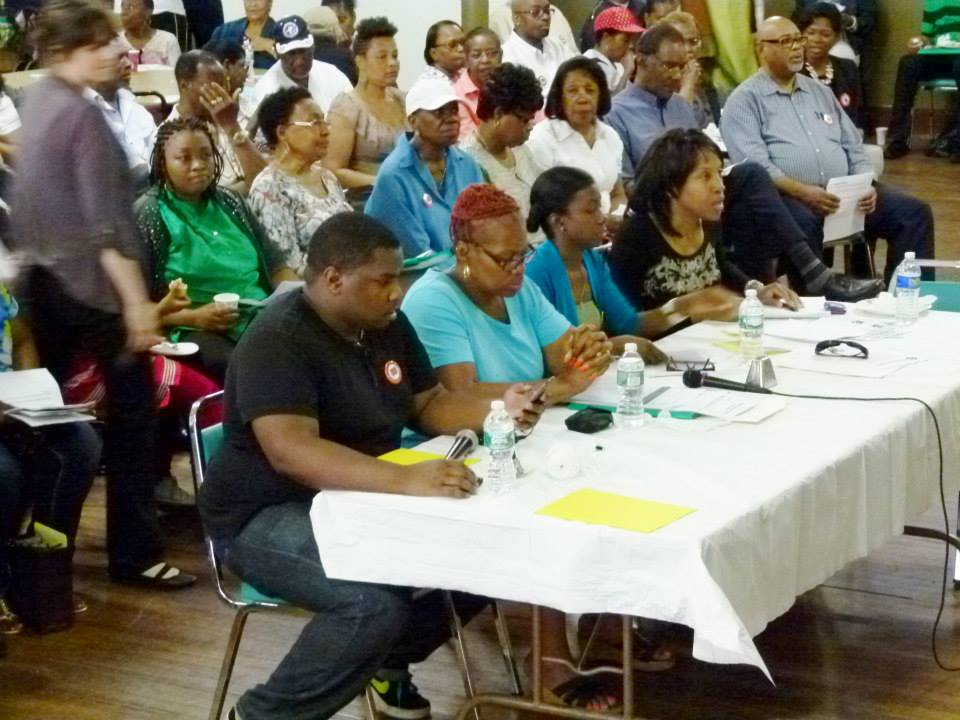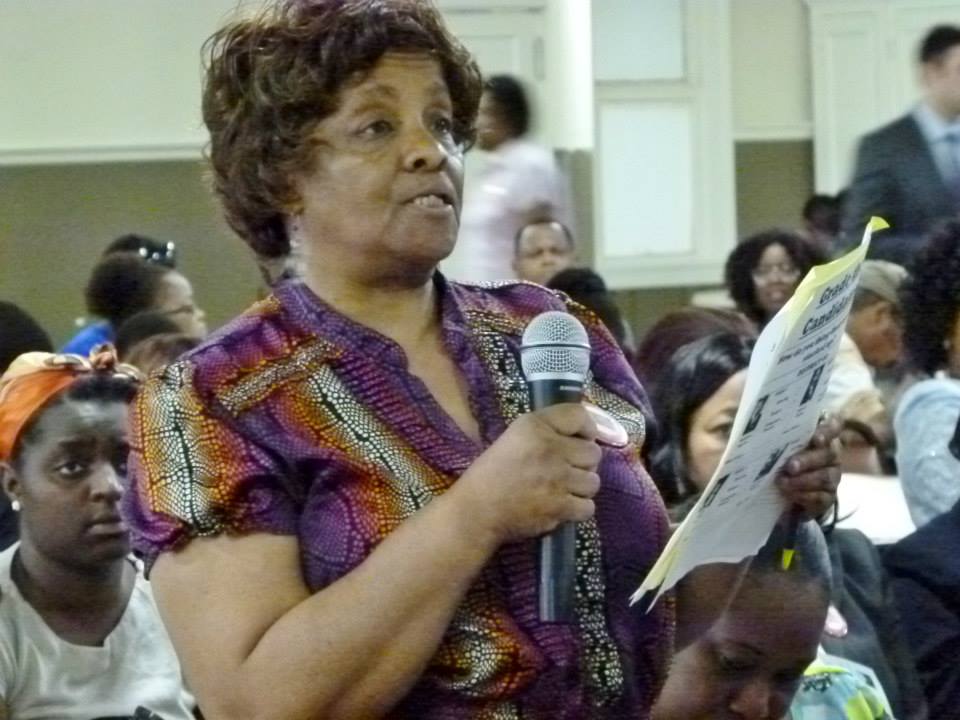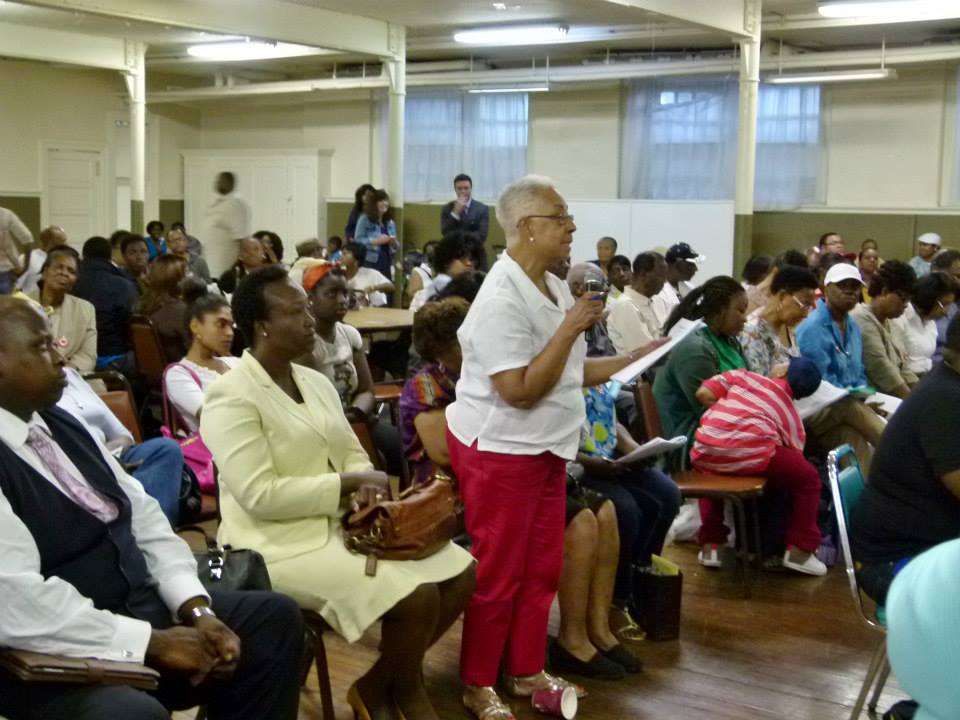Slumlords, Rent Increases & Why Tenants Can’t Win: The FTC City Council Candidates Forum


This Saturday’s City Council Candidate Forum, held by the Flatbush Tenant Coalition, featured incumbent and prospective Council Members from Districts 40, 41, and 45, and drew a crowd of local tenants who wanted to know what those candidates could do for them.
District 40 candidates John Grant, Saundra Thomas, Sylvia Kinard, and current Council Member Mathieu Eugene were in attendance to discuss how they would each protect tenants’ rights were they to win a City Council seat.
First, each candidate was asked to briefly state his or her platform.
Eugene thanked and congratulated the FTC, and said he’s been working for tenants and families since before he was elected. “The only difference now,” he said, “is I’m doing it with more resources.”
Grant said he grew up in this neighborhood, and wants to bring back the same opportunities for youth he had as a kid. He is a proponent of after school programs, as he said in our previous interview, and wants to keep youth from getting in trouble and ending up in jail. He also believes in affordable housing.
Kinard told the audience that as an attorney and the only candidate on the panel with housing experience, she is appalled by the Rent Guidelines Board’s vote to approve rent increases. This got huge applause from the audience, but did not impress a Eugene staffer*, who clarified the vote was only preliminary. The final vote will take place this Thursday, June 20.
Thomas talked about having lived in the neighborhood for 14 years and currently raising her daughter here. She said she’d worked with FDC and Sustainable Flatbush, and that tenants in this community need a champion.

Moderators Tammy Brake and Roylyn Henery, note-taker Toni Booker, and time-keeper Andre Johnson Brown, via the Flatbush Tenant Coalition
Question 1: Flatbush Gardens owner David Bistricer owns 141 Livingston St. (and, as it turns out, 250 Livingston St.), and collects millions of dollars a year for government-rented space. How do you feel about the city using public funds to rent from slumlords?
Eugene began his response by wishing attendees a Happy Father’s Day. He said that the money the city is using to pay that rent is “from taxpayers, not from you.” He said that he uses public money for services, and that’s how it should be used by the city–“for the people, not any other group.”
Grant said he believes slumlords should be held accountable for problems in building maintenance, or else they should be forced to stay in the building to understand conditions there. He also said there should be more transparency about where money is coming from.
Kinard blamed the Giuliani administration for giving public property to private developers, and said corruption is going on. She added that civil penalties need to be enforced against landlords, and that were she to win the City Council seat, she would have a help desk at her office to link tenants to law organizations with housing court clinics. She also said the Housing Authority wants to turn projects into for-profit housing, and she would address that in office. Eugene’s staff member leaned over at this point to say Kinard was a registered Republican during in the 1990s during Giuliani’s run as mayor, later sending this article to reiterate.
Thomas said that public funds are the people’s money, and if it’s not being used to help the people, it’s being used to hurt them. She said if she was voted into office, she would join the public in “standing together” and fight developers who are trying to pushing people out of their homes. She echoed Sylvia Kinard’s interest in making legal information and resources more accessible to tenants.

FTC leader Gloria Campbell asks about the Rent Guidelines Board selection process, via Flatbush Tenant Coalition
Question 2: If the City Council gets power over the Rent Guidelines Board, how would you make sure the choosing of board members would more equally represent tenants?
Eugene said he would make sure tenants have opportunity to express their issues, and would freeze rent increases.
Grant said he would begin by putting tenants who have experience with slumlords on the board, and would halt rent increases. He said people shouldn’t have to choose between eating and paying rent, and that longtime tenants should stop having to move out to make room for new people moving into the neighborhood.
Kinard said that first City Council would have to get power they haven’t had since the 1980s. She said Borough Presidents don’t even have budget control anymore, since it has all been consolidated to the Mayor’s Office. She said she would like to work with state legislators to get the power to change the composition of RGB, as right now there are only two tenant representatives out of the nine people on the board.
She said the most immediate issue, again, was the vote for rent increases. And again, the Eugene staffer took issue with her phrasing, which made it unclear as to whether she was saying the voting process was completely finished.
Thomas alluded to the preliminary/upcoming RGB vote as well, saying, “9% rent increases are not okay. We don’t get 9% salary increases.” She said she wants “to bring sense back to City Hall,” and that council members need to work together. She believes the general public has given up fighting, but that they need to reclaim their power.
Question 3: What is your position on holding landlords accountable for offenses like lack of heat and hot water? They go to court and nothing is done about it. How would you make sure penalties are enforced?
Eugene said he works with grassroots organizations to make sure landlords do repairs, and that tenants should receive more help, since they don’t have the resources to hire lawyers like landlords do. He said City Council members should put resources into organizations like the FTC to help defend tenants, and that punishment for landlords should be stronger.
Grant said an effective tactic for tenants would be to use their rent money to pay for their own repairs instead. “If you don’t make repairs,” he said, “fine. I won’t pay the rent.” He said tenants could then forward their repair receipts to the court system to show proof.
Kinard started off this answer by saying, “Talk is cheap.” She then said her plan to help tenants succeed legally against landlords was first to install that aforementioned help desk in her office for pro bono legal work; then, to start class action suit against notorious slumlords; and last, to hold the city’s feet to fire about enforcing statutes and providing better oversight. “I want to create a better Brooklyn for everyone,” she said.
Thomas wants to make it easier for tenants to understand their rights and move their grievances to court in the first place. She said there should be court interpreters for tenants who speak other languages, and that people shouldn’t have to take the day off work to go to court when landlords don’t even bother showing up. “Stop making it so easy for tenants to lose,” she said, adding that evening appointments should be made available to tenants so that they’ll actually be home when inspectors show up.

Jean Folkes talks campaign finance laws, via Flatbush Tenant Coalition
Question 4: Would you be willing to make your sources of campaign funding more accessible and open to your constituents?
Eugene said campaign funding is public knowledge, and his campaign is willing to share any information needed. He said New York has some of the best campaign finance laws in the country. He then returned to the last question, saying he believes poorly-maintained buildings should be taken from their landlords and given to tenants. He said he’s helping tenants in that situation right now (his staffer says at 265 Hawthorne St.) If a landlord refuses to do repairs, he said, work needs to be done with the city to help tenants.
Grant echoed the “it’s public” sentiment, and that he has no problem providing information.
Kinard said what’s less visible through public reports than numbers is influence–specifically influence from powerful landlords. “Don’t just look at who writes a check for a candidate,” she said. “Look at other forms of endorsement.”
Thomas agreed with Eugene about NY campaign finance laws, but that the information on the Campaign Finance Board site isn’t enough. She said candidates should include funding info in their newsletters and on their websites at all times, not just during campaign times. She said laws should be changed so that developers can’t give more than a certain amount of money, as with corporations.
The floor was then opened to questions from the public. One woman asked what candidates would do about unlawful eviction, saying she went to court with a good lawyer against her landlord and won, but was later locked out of her apartment by a marshal. She said that upon returning to court, she learned that the judge had awarded her apartment to her landlord. She is currently homeless.
Eugene said he has been working with many tenant organizations, and that individual tenants can’t go through the system. “You cannot beat them,” he said, repeating that he wants City Council to put more money into tenant organizations, as well as give communities stronger representation and more resources.
Kinard said her attorney should appeal the judge’s decision to give her landlord her apartment, and said her proposed help desk would help tenants keep records for more effective work in court. She said since the votes to elect judges, that each judge’s housing records should be scrutinized, and that voters should hold them accountable for their decisions.
Thomas said one thing she learned while working at WABC for 25 years and handling consumer complaints was that keeping records is essential. She said a community task force should also be put together with tenants and homeowners to make sure all have the necessary information and legal representation.
Eugene chimed back in at this point, telling the tenant to come to his office and he’d see what he could do to help.
Finally, each candidate was asked to give a closing statement.
Grant said these issues need to be handled and not just used as rhetoric for years on end–“Just do it, and stop talking about it.”
Eugene said, “You name it, I’ve done it.” He said he has created affordable housing in the district, and those looking for affordable housing should visit his office and ask about it. He also said he believes education is the best investment a society can make. He closed with, “I’ve been there–I know how to do it.”
Kinard said to find out more on her on website. She repeated that she wants to create “a better Brooklyn for all,” and said that policies need to be changed after the last 8 years (Eugene’s staffer said he’d only been in office 6 years, although Kinard hadn’t explicitly referred to Eugene as the “8 year” issue), and that a new city government was needed.
Thomas reiterated her desire to be the public’s champion, saying, “Housing is complicated. What’s not complicated is hard work, and that people who want to live in this community should be able to stay in this community.”

Finally, a representative for the FTC got up to thank the candidates, and remind them of their duties should they get elected. “Step out of your nice cozy office,” he said, “and walk through this district. Ask questions. You’re supposed to serve us.”
*It seems important to acknowledge here that while the staffer’s comments were taken into consideration, none of the other candidates had anyone pointing out what was said or implied by their opponents that may have been inaccurate or flat-out false. Perhaps the fairest way for Council Member Eugene to make a statement about his platform and the downfalls of his opponents’ platforms would be for him to sit down with us for an interview. Until that opportunity is taken by the Council Member, you can read our interviews with John Grant, Sylvia Kinard, and Saundra Thomas.
Do the candidates’ positions on housing and tenants’ rights change your feelings about them at all? Anyone surprise you, in good ways or bad? And if no one mentioned them, what changes would you like to see made?
